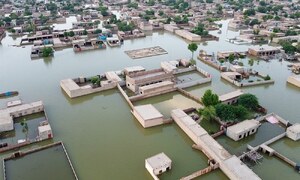Victor, a labourer, earns 500 dirhams (136 dollars) a month in the booming Gulf emirate of Dubai. After paying 80,000 rupees (1,748 dollars) to an agent in India to find him the job, he says he is unhappy and wants to go home. Like millions of expatriate labourers lured by the prospect of high salaries in the Gulf, he is the antithesis of what luxury-laden Dubai has become, in its multi-billion-dollar drive to emerge as the region's commercial and leisure hub.
Its success has been realised largely through the efforts of hundreds of thousands of poorly paid Asians, many of whom live in dire conditions and toil long hours in temperatures as high as 50 degrees Celsius (122 Fahrenheit).
Reports of abuse and non-payment are widespread in the United Arab Emirates (UAE), to which Dubai belongs, home to just over four million people.
One such case ended in tragedy this month when an Indian worker committed suicide in Dubai because his company refused to lend him 13 dollars to see a doctor, after five months of not paying his wages.
Indians, Pakistanis, Bangladeshis, Sri Lankans and Iranians are estimated at nearly 40 percent of the UAE population, while other Asian, Arab, Western and African nationalities make up another 40 percent approximately.
But as Dubai depends on the likes of Victor to help achieve its ambitions, so too must he work for his family's survival back home.
"The demand to come here is high," said Tariq Deemas al-Suweidi, work permit department manager at the ministry of labour and social affairs in Dubai, which hosts 957,000 foreign workers out of a population of 1.2 million.
Last year, half a million work permits were issued in the UAE, 50 percent of them in Dubai.
Among the Gulf Arab states, Dubai "is the best one" for labourers, he told AFP. Many workers only able to speak their native tongue upon arrival often leave with more skills.
When he first arrived in the UAE, Victor said he was paid 350 dirhams a month for his first 18 months in the emirate of Ajman. He had to remit the bulk of his earnings to his family back home and pay off the huge debt incurred just to get the job.
He still lives frugally on 200 dirhams a month and shares a small room with eight other workers.
There is no minimum wage in UAE law, leaving salary payments open to exploitation. But Suweidi said he was unaware of workers in Dubai earning less than 400 to 500 dirhams a month, excluding food and accommodation.
"The ministry follows up on as many complaints as it can or that merit attention," he said. In the first nine months of 2004, it received a total of 3,149 complaints from employees.
"We can't inspect or monitor all work and living conditions, it's a huge market. But in cases of complaints, we do, depending on the complaint and need. If working conditions are bad, we stop issuing visas to that company. We stop dealing with companies that don't pay their workers," Suweidi said.
Those who persistently refuse to pay up are taken to court. Companies importing workers are required to pay nearly 1,500 dollars for each, including a bank guarantee and fees.
"Given the size of the community, the disputes are not that much," said a spokesman at Pakistan's embassy in the UAE. Some 450,000 Pakistanis live in the federation, almost 50 percent of them in Dubai.
"The basic complaints are non-payment, or workers not paid as per the contract," the spokesman said.
"I don't think the labour problem is of a big magnitude," he added, saying that the UAE government co-operates to solve labour issues.
A lack of awareness can result in workers signing contracts to their disadvantage, while those "who come illegally would have to pay huge amounts. The unscrupulous elements charge them a lot then leave them high and dry," said the spokesman.
He insisted the Pakistani government "is planning to clamp down" on illegal traders.
One Dubai-based employer told AFP there were cases in his company being investigated whereby employees were forced to concede a portion of their meagre salary to their immediate supervisor.
He said he had no doubt such exploitation was commonplace but difficult to eradicate due to intimidation.
BR100
15,115
Increased By
28.1 (0.19%)
BR30
43,048
Increased By
175.6 (0.41%)
KSE100
149,493
Increased By
257.8 (0.17%)
KSE30
45,518
Increased By
11.6 (0.03%)























Comments
Comments are closed.